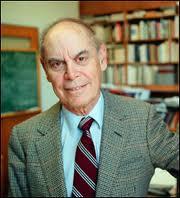
GERALD HOLTON
Gerald James Holton (born May 23, 1922) is Mallinckrodt Research Professor of Physics and Research Professor of the History of Science, Emeritus, at Harvard University.Born 1922 in Berlin, he grew up in Vienna before emigrating--thanks to the Kindertransport--in 1938. He received an electrical engineering certificate from the School of Technology, City of Oxford (now Oxford Brookes University) and then Wesleyan University, where he received B.A. (1941) and M.A. (1942) degrees.As a student of Percy Williams Bridgman, he obtained his Ph.D. at Harvard in 1948. His chief interests are in the history and philosophy of science, in the physics of matter at high pressure, in education, and in the study of career paths of young scientists. Along with co-author Gerhard Sonnert he has studied and published works on the gender gap in science studies and careers. In 1952, he published Introduction to Concepts and Theories in Physical Sciences, a seminal work in the development of physics education, which led to Harvard Project Physics, the NSF sponsored national curriculum-development project that he co-directed. Gerald Holton is a Fellow of the American Physical Society, the American Philosophical Society, and the American Academy of Arts and Sciences (1956), as well as several European learned societies. He served as President of the History of Science Society from 1983-84 and served on a number of U.S. National Commissions, including those on UNESCO and Excellence on Education. He also served on the board of trustees of Science Service, now known as Society for Science & the Public, from 1972-1978.His book publications include Thematic Origins of Scientific Thought, The Scientific Imagination, Einstein, History and Other Passions, Science and Anti-Science, and Victory and Vexation in Science. He is also author, with Gerhard Sonnert, of What Happened to the Children Who Fled from Nazi Persecution and "Who Succeeds in Science--The Gender Dimension".Holton is founding editor of the quarterly journal Daedalus, and founder in 1972 of the Newsletter on Science, Technology, and Human Values (from 1976 Science, Technology, and Human Values). He was also on the editorial committee of the Collected Papers of Albert Einstein. Professor Holton has received the Sarton Medal of the History of Science Society, the Andrew Gemant Award of the American Institute of Physics, the Abraham Pais Prize of the American Physical Society, and the Robert A. Millikan award of the American Association of Physics Teachers.In 1981 the National Endowment for the Humanities selected Holton for the tenth Jefferson Lecture, the U.S. federal government's highest honor for achievement in the humanities. Holton was the first scientist selected for this honor, and his lecture was entitled "Where is Science Taking Us?" In his lecture, Holton argued that Jefferson's vision of science as a force for social improvement was still viable, opined that there had been a "relocation of the center of gravity" of scientific inquiry toward solving society's important problems, and cautioned that science education had to be improved dramatically or only a small "technological elite" would be equipped to take part in self-government.A considerable collection of his papers have been collected, processed, and annotated by the archivists at Harvard University Archives, donated by Holton since 2007. It is accessible, free, by searching for "Gerald Holton, Personal Archive, Harvard"